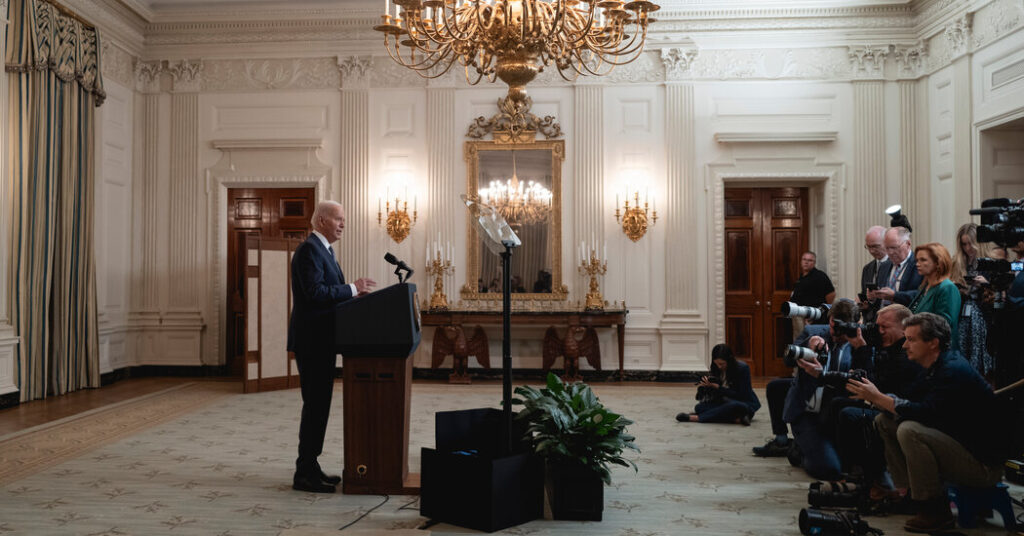Friday’s speech was Biden’s first public statement on the war since an Israeli attack and subsequent fire on Sunday killed at least 45 people, including children, and injured 249 others in a displacement camp, according to Gaza health officials. Comment. A New York Times visual analysis found that Israel used U.S.-made bombs in the attack, forcing the White House to confront questions about U.S. responsibility for the rising death toll.
Biden said Friday he saw “horrible images” of the deadly fires.
“The Palestinian people have suffered utter hell in this war,” Biden said, after describing the pain of relatives “who were massacred by Hamas terrorists on October 7” and the “pain” of Israeli families awaiting the release of hostages. torture”. .
Biden also said too many innocent people have been killed in Gaza, “including thousands of children,” and addressed many Americans who are angry about his administration’s handling of the conflict.
“I know people in this country hold deeply passionate beliefs about this subject,” Biden added. “So do I. This is one of the most difficult and complex problems in the world. Nothing about this is going to be easy. .
Describing Israel’s four-and-a-half-page proposal, Biden said it would be divided into three phases. It started with a roughly six-week ceasefire that saw Israeli forces withdraw from the densely populated areas of Gaza and release elderly and female hostages held by Hamas in exchange for the release of hundreds of Palestinian detainees. Biden said there were still details that needed to be negotiated before moving to the next phase — including apparently how many Palestinians would be released in exchange for each Israeli hostage freed.
In phase two, all remaining Israeli hostages will be released, including male soldiers, as described by a senior administration official briefed by reporters after Biden spoke. The official said all hostilities will end and all Israeli troops will withdraw from Gaza. Mr Netanyahu has publicly rejected a complete troop withdrawal in the past, insisting it would lead to the resurgence of Hamas to once again take control of the territory.
From descriptions provided to reporters in briefings, it was unclear who would administer the territory, although the United States has said in the past that it would most likely be the Palestinian Authority, which has struggled to govern the West Bank.
In the third phase, with the support of U.S., European and international agencies, the remains of the hostages will be exchanged, the rubble will be cleared, and a three- to five-year reconstruction period will begin. But given the extent of the destruction and near-famine conditions, the plan sounds almost ambitious.
However, Mr Biden said the road map was reasonable if terrorist groups moved forward. “As long as Hamas fulfills its commitments, the temporary ceasefire will become, in the words of the Israeli proposal, a permanent cessation of hostilities,” Biden said.
U.S. officials said they believed Israel had made significant concessions in hostage negotiations following a meeting in Paris over the weekend between CIA Director William J. Burns and David Bania, the head of Israel’s Mossad spy agency. These include reducing the number of live hostages required to be released in the early stages.
However, a source familiar with the matter said talks were “on hold” while Israel carried out operations in Rafah.
Biden has also been involved in hostage negotiations, although he has not traveled to any negotiating meetings. Officials say Biden’s role is most notable for pressuring Netanyahu to continue negotiations and reduce Israel’s demands.
But on Friday, Biden apparently focused the pressure on Hamas, arguing that accepting the offer was their best chance of ending the war and achieving a ceasefire.
“Everyone who wants peace must speak out now,” Biden said, adding that the public should let Hamas leaders “know that they should accept this deal. Work to make it a reality, make it lasting, and Create a better future from tragic terrorist attacks and war.
Aaron Boxerman contributed reporting from Jerusalem, and Julian E.Barnes From Washington.

